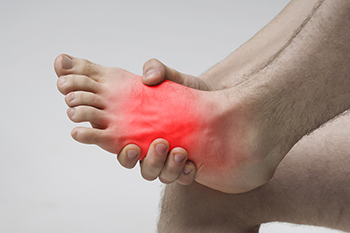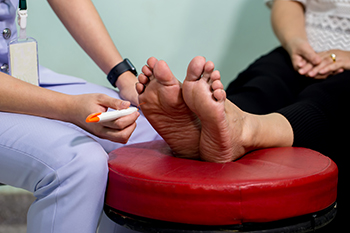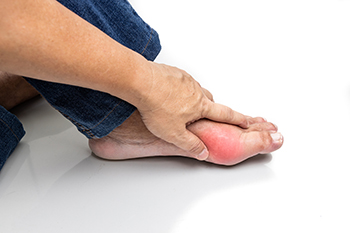NJ (908) 688-5577
NY (212) 737-2528

Most children take their first steps between eight and 18 months of age. Initially, toddlers often exhibit flat feet or a tendency to turn their feet inwards due to muscle strength and ligament stiffness catching up with their overall development. This flat-footedness typically improves as the bones strengthen and the feet gain more muscle support. Additionally, some toddlers may walk with one or both feet turned inwards, known as in-toeing, which can originate from the foot, lower leg, or upper leg. In rare cases, toddlers may walk with their feet turned outwards, or out-toeing. Parents should also look for signs such as abnormally shaped toes, persistent or painful ingrown toenails, bunions, foot stiffness, limping, or a sudden change in the child's walking pattern. Other common causes of foot pain include ingrown toenails that persist, and deformities or lumps in the foot. If your child complains of pain while walking, limps, or demonstrates a significant change in their walking pattern, or if your child hasn't started walking by the age of two, a consultation with a podiatrist can help rule out potential developmental concerns. In cases of pain, limited function, or a sudden change in your child's walking pattern, it is a good idea to schedule an appointment with a podiatrist for a thorough exam and diagnosis.
The health of a child’s feet is vital to their overall well-being. If you have any questions regarding foot health, contact Glenn Davison, DPM of Advanced Podiatry. Our doctor can provide the care you need to keep you pain-free and on your feet.
Tips for Keeping Children's Feet Healthy
If you have any questions, please feel free to contact our offices located in Union, NJ and New York . We offer the newest diagnostic and treatment technologies for all your foot care needs.

Engaging regularly in high-impact activities, like basketball, running, or professional dancing, may expose you to the discomfort of a foot stress fracture. This overuse injury involves hairline cracks in weight-bearing bones of the foot. If left untreated, a stress fracture in the foot can escalate into a more serious concern. However, stress fractures are not always easy to diagnose. Pain upon weight-bearing activities that often subsides after rest is a primary indicator of stress fractures. Tenderness in the affected area, occasional bruising, and swelling around the ankle are other signs to be noted. Various factors contribute to the development of stress fractures in the foot. Overuse and repetitive stress, stemming from prolonged engagement in activities without adequate rest, can subject the foot bones to cumulative stress. Wearing inadequate footwear, whether ill-fitting or worn-out, further elevates the risk by providing insufficient support and shock absorption. Additionally, suddenly increasing the intensity or duration of physical activity can overwhelm the bones, especially without sufficient time to adapt. Nutritional deficiencies, particularly in calcium and vitamin D, can weaken bones and make them more susceptible to hairline fractures. If you believe you may have incurred a foot stress fracture, it is suggested that you make an appointment with a podiatrist for a thorough exam and suitable imaging tests and treatment options.
Stress fractures occur when there is a tiny crack within a bone. To learn more, contact Glenn Davison, DPM from Advanced Podiatry. Our doctor can provide the care you need to keep you pain free and on your feet.
How Are They Caused?
Stress fractures are the result of repetitive force being placed on the bone. Since the lower leg and feet often carry most of the body’s weight, stress fractures are likely to occur in these areas. If you rush into a new exercise, you are more likely to develop a stress fracture since you are starting too much, too soon. Pain resulting from stress fractures may go unnoticed at first, however it may start to worsen over time.
Risk Factors
Stress fractures do not always heal properly, so it is important that you seek help from a podiatrist if you suspect you may have one. Ignoring your stress fracture may cause it to worsen, and you may develop chronic pain as well as additional fractures.
If you have any questions, please feel free to contact our offices located in Union, NJ and New York . We offer the newest diagnostic and treatment technologies for all your foot care needs.

Diabetes is a complex condition that affects various parts of the body, and one often underestimated area is the feet. One of the most common diabetes-related foot problems is neuropathy, which can result in a loss of sensation. Additionally, it can cause tingling, pain, or weakness in the foot. This loss of sensation can lead to injuries that are unnoticed, such as stepping on a tack or developing a blister, which can worsen and become infected. In addition, nerve damage can also alter the shape of your feet and toes, making it essential to avoid wearing ill-fitting shoes. Having high blood sugar levels for an extended period of time can also cause blood vessels in the foot and leg to narrow and harden, inhibiting proper blood flow to the extremities. This poor circulation to the feet makes them less able to heal and fight off infections and can result in the development of ulcers. If left unattended, foot ulcers can turn into gangrene and possibly the loss of a limb. Wearing proper footwear, lifestyle changes, and working closely with your podiatrist are essential steps in managing diabetes and protecting your feet from complications. If you have foot problems that result from diabetes, it is suggested that you make regular appointments to see a podiatrist for checkups.
Diabetic foot care is important in preventing foot ailments such as ulcers. If you are suffering from diabetes or have any other concerns about your feet, contact Glenn Davison, DPM from Advanced Podiatry. Our doctor can provide the care you need to keep you pain-free and on your feet.
Diabetic Foot Care
Diabetes affects millions of people every year. The condition can damage blood vessels in many parts of the body, especially the feet. Because of this, taking care of your feet is essential if you have diabetes, and having a podiatrist help monitor your foot health is highly recommended.
The Importance of Caring for Your Feet
Patients with diabetes should have their doctor monitor their blood levels, as blood sugar levels play such a huge role in diabetic care. Monitoring these levels on a regular basis is highly advised.
It is always best to inform your healthcare professional of any concerns you may have regarding your feet, especially for diabetic patients. Early treatment and routine foot examinations are keys to maintaining proper health, especially because severe complications can arise if proper treatment is not applied.
If you have any questions please feel free to contact our offices located in Union, NJ and New York . We offer the newest diagnostic and treatment technologies for all your foot and ankle needs.

Gout is not only about discomfort. If not addressed, especially when it is ongoing, it can evolve into major health challenges over the years. There are formations called tophi, which essentially are hardened clusters of urate crystals. These can emerge in various areas, including the feet. Even though they might not always be painful, neglecting them can harm your bones, cartilage, and joints. With prolonged gout, individuals often experience regular joint inflammation. This consistent swelling, combined with tophi, can result in permanent joint alterations and rigidity. In extreme situations, surgical intervention might be necessary to rectify or even replace damaged joints. Additionally, gout raises the likelihood of kidney stone formation. This happens because urate crystals can accumulate in the urinary system. Over time, if these stones block your kidneys, it can lead to scarring and damage. There's a belief that this kind of kidney damage, if not treated, can progress to chronic kidney ailments. Moreover, the persistent pain due to chronic gout can be mentally taxing. It can hinder daily activities like walking and working, leading to emotional strain. If you have gout, it is strongly suggested that you make a n appointment with a podiatrist to get treatment for this painful affliction before it takes more of a toll on your body and mind.
Gout is a painful condition that can be treated. If you are seeking treatment, contact Glenn Davison, DPM from Advanced Podiatry. Our doctor will treat your foot and ankle needs.
What Is Gout?
Gout is a form of arthritis that is characterized by sudden, severe attacks of pain, redness, and tenderness in the joints. The condition usually affects the joint at the base of the big toe. A gout attack can occur at any random time, such as the middle of the night while you are asleep.
Symptoms
Risk Factors
Prior to visiting your podiatrist to receive treatment for gout, there are a few things you should do beforehand. If you have gout you should write down your symptoms--including when they started and how often you experience them, important medical information you may have, and any questions you may have. Writing down these three things will help your podiatrist in assessing your specific situation so that he or she may provide the best route of treatment for you.
If you have any questions, please feel free to contact our offices located in Union, NJ and New York . We offer the newest diagnostic and treatment technologies for all your foot care needs.